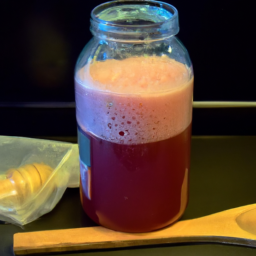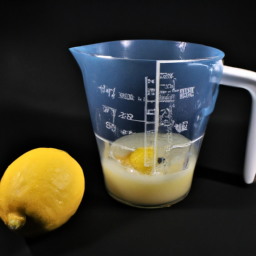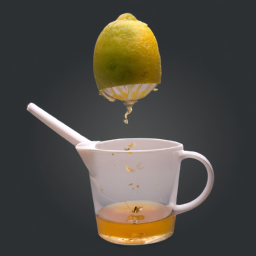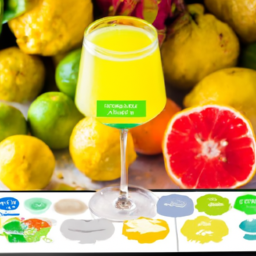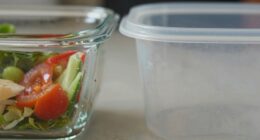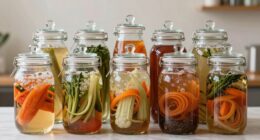I am fascinated by the amount of juice that can be extracted from an orange. As someone who enjoys beginning my day with a tall glass of freshly squeezed orange juice, I often contemplate the potential yield of each orange.
After all, the amount of juice in an orange can vary depending on a number of factors, from the variety of orange to the ripeness of the fruit. In this article, I’ll explore the importance of understanding orange juice yield, the factors that affect it, and some tips for maximizing the amount of juice you can extract from your oranges.
As it turns out, understanding orange juice yield is crucial if you want to get the most out of your juicing efforts. After all, if you’re using a lot of oranges but only getting a small amount of juice from each one, you’re not going to end up with a very satisfying glass of juice.
By understanding the factors that affect juice yield, you can choose the best oranges for juicing, use the right techniques to extract as much juice as possible, and even measure your yield to ensure you’re getting the most out of your efforts. So let’s dive in and explore just how much juice is in one orange.
Key Takeaways
- Choosing ripe and juicy oranges without bruises or soft spots is crucial for maximizing juice yield.
- Measuring orange juice yield accurately requires appropriate juicing equipment, straining, and a calibrated measuring cup.
- One cup of orange juice contains 112 calories, 22g sugar, and 124% of recommended daily intake of vitamin C.
- Incorporating orange juice into a balanced diet can boost the immune system, promote healthy skin, and add citrus flavor to cooking and baking.
The Importance of Understanding Orange Juice Yield
Understanding how much juice can be squeezed out of an orange is like discovering a hidden treasure within the fruit. Juice extraction is not only important for those who love to drink orange juice, but also for those who want to maximize the nutritional value of the fruit.
By knowing the yield of juice from an orange, you can adjust the amount of oranges needed to meet your daily vitamin C intake or to make a delicious glass of juice. The nutritional value of orange juice is well-known, as it contains essential vitamins and minerals that are good for the body.
However, the amount of juice yielded from an orange can vary depending on several factors, such as the variety of the orange, the ripeness of the fruit, and the extraction method used. These factors can affect the amount of juice that can be obtained from an orange, which is why it’s important to understand them before squeezing the fruit.
Factors That Affect Orange Juice Yield
When squeezing an orange, there are several factors that can affect how much juice you can yield. Firstly, the ripeness of the orange plays a significant role in its juice extraction. A riper orange will generally yield more juice than an unripe one.
Secondly, the size of the orange also matters in juice extraction. Larger oranges tend to have more juice content than smaller ones.
Thirdly, the juiciness of the orange, which can be determined by how easily the segments separate from one another, can also affect how much juice you can extract.
Finally, the method of juicing can also impact the yield of juice.
Factors affecting citrus juice extraction are critical to consider when juicing citrus fruits. Best practices for juicing include choosing ripe and juicy oranges, using a manual or electric juicer, and applying gentle pressure to extract the juice without crushing the seeds. It’s also crucial to avoid over-juicing the fruit, as this can lead to a bitter taste.
In the next section, I’ll discuss how to choose the best oranges for juicing.
How to Choose the Best Oranges for Juicing
To get the most out of your morning glass of OJ, it’s important to pick oranges that feel heavy for their size, like a dense little sun in your hand.
Choosing the right ripeness is also crucial. Oranges that are too ripe may be sweet, but they won’t yield as much juice as firmer ones. Look for oranges that are bright in color and have a slight give when squeezed.
Avoid oranges with bruises or soft spots, as these indicate damage that can affect flavor and juice yield.
Once you have your perfect oranges, it’s time to start juicing. But before you do, there are a few tricks for maximizing your orange juice yield.
Stay tuned for my tips on how to get the most juice out of your oranges without wasting a drop.
Tricks for Maximizing Your Orange Juice Yield
Get ready to squeeze every last drop of deliciousness out of your oranges with these juicing techniques for maximizing your OJ yield.
One of the easiest tricks is to roll your oranges before juicing. By doing so, you’ll be breaking down the membranes inside the fruit, allowing for an easier release of the juice.
Additionally, try microwaving your oranges for 15-20 seconds before juicing them. This will help to loosen up the juice and make it easier to extract.
If you don’t have a citrus press, don’t worry! There are still alternative methods for juicing your oranges. For example, you can use a fork to help you extract the juice. Simply slice your orange in half and then use the fork to poke and twist the fruit until all the juice is released.
Another option is to use a blender to puree your oranges and then strain the mixture to separate the juice from the pulp. With these tips, you’ll be able to extract as much juice as possible from your oranges, which is important to know when measuring orange juice yield.
Transitioning into the subsequent section, it’s important to note that measuring your orange juice yield is essential when following recipes or when tracking your daily intake. So, let’s dive into how to measure the amount of juice in one orange.
How to Measure Orange Juice Yield
Measuring your orange juice yield is a must-know for anyone who loves to cook or wants to track their daily citrus intake. To ensure measuring accuracy, there are a few factors to consider.
First, make sure to use a juicing equipment that is appropriate for the size of your orange. A smaller juicer might not be able to extract all the juice from a larger orange, resulting in an inaccurate measurement.
Next, be mindful of the amount of pulp and seeds in your juice. Straining your juice before measuring it is a good practice to ensure that you’re only measuring the liquid portion.
Lastly, use a measuring cup that is calibrated to the appropriate unit of measurement, such as ounces or milliliters. With these tips, you can ensure that you’re accurately measuring your orange juice yield every time.
When you know how much juice you’re getting from each orange, you can better plan your citrus intake and make sure you’re getting the right amount of nutrients. Drinking orange juice has numerous health benefits, from boosting your immune system to improving your skin health. So, let’s dive into the next section and learn more about the benefits of drinking orange juice.
Health Benefits of Drinking Orange Juice
You’re missing out on a world of vibrant health and a glowing complexion if you don’t indulge in a glass of fresh, zesty orange juice now and then. Orange juice is packed with essential nutrients such as vitamin C, potassium, folate, and thiamine. These nutrients are vital in maintaining a healthy immune system, reducing the risk of chronic diseases, and promoting healthy skin.
According to the United States Department of Agriculture, one cup of orange juice (237 ml) contains 112 calories, 22 grams of sugar, and 124% of the recommended daily intake of vitamin C. While orange juice is a healthy beverage choice, it’s important to consume it in moderation due to its high sugar content. The recommended daily intake of orange juice is one to two cups per day.
Incorporating orange juice into a balanced diet can provide numerous health benefits, but it’s important to consider the nutritional value and recommended intake to avoid consuming excessive amounts of sugar.
Transitioning into the subsequent section about other uses for orange juice, it’s important to note that orange juice doesn’t have to be consumed solely as a beverage. There are numerous other ways to incorporate orange juice into meals, such as using it as a marinade for chicken or fish, adding it to a smoothie, or using it as a base for salad dressings.
Other Uses for Orange Juice
I love using orange juice in my cooking and baking. It adds a bright and tangy flavor to dishes like chicken marinades and fruit salads.
Orange juice is also a great ingredient in cocktails, adding a refreshing twist to classic drinks like mimosas and screwdrivers.
Cooking and Baking
When I’m baking a cake, I always make sure to squeeze fresh orange juice for a burst of citrus flavor. Not only does it add a refreshing taste to the batter, but it can also help with the leavening process.
Juice extraction is fairly easy, all you need is a citrus juicer or simply use your hands to squeeze the juice out of the fruit. But don’t forget about the orange zest! The fragrant oils found in the orange peel can add depth to any baked good. Use a microplane to finely grate the zest and add it to your batter for an extra pop of flavor.
When it comes to cooking, orange juice can be used in a variety of ways. For savory dishes, it can be reduced and mixed with soy sauce, honey, and ginger to create a flavorful glaze for chicken or pork. But it’s not just limited to main dishes.
Add a splash of orange juice to your salad dressing or marinade for a refreshing twist. And if you’re feeling adventurous, try adding it to your homemade barbecue sauce for a tangy kick.
Now, onto cocktails…
Cocktails
If you’re looking to add a zesty twist to your next drink, try incorporating some freshly squeezed citrus into your cocktail mix. As a mixology enthusiast, I’ve found that adding orange juice to my cocktails can really enhance the flavors and give them a unique twist.
Here are some mixology tips and flavor pairings to consider when working with freshly squeezed orange juice:
- Use a citrus press to extract as much juice as possible from the orange.
- Use the juice immediately after squeezing to ensure maximum freshness and flavor.
- Experiment with different types of oranges, such as blood oranges or mandarins, for unique flavor profiles.
- Balance the sweetness of the orange juice with other ingredients, such as bitter or sour flavors.
- Use fresh garnishes, such as orange twists or slices, to add an extra pop of citrus to your cocktail.
Flavor Pairings:
- Orange juice pairs well with vodka, gin, and tequila.
- Try pairing orange juice with Campari or Aperol for a refreshing and bitter cocktail.
- Orange juice can also be used to balance out sweeter flavors, such as in a Mai Tai or Margarita.
When it comes to storing orange juice, it’s important to keep in mind that freshly squeezed juice has a short shelf life. To ensure that your orange juice doesn’t go bad, store it in an airtight container in the refrigerator and use it within a few days.
Storing Orange Juice
Storing orange juice properly ensures that the refreshing taste and nutrients are preserved. The best storage methods depend on the type of orange juice and the juicer used. Freshly squeezed orange juice can be stored in an airtight container in the refrigerator for up to three days. However, commercially produced orange juice can last up to two weeks in the refrigerator due to pasteurization.
Different types of orange juicers can also affect the shelf life of orange juice. For example, a centrifugal juicer produces a lot of heat and air, which can cause the orange juice to deteriorate faster. On the other hand, a masticating juicer operates at a lower speed and produces less heat and air, which results in a longer shelf life for the orange juice. It is essential to clean the juicer thoroughly before use to prevent bacterial growth, which can cause spoilage of the orange juice.
When it comes to storing orange juice, the right storage method can make a significant difference in taste and freshness. However, even if you store your orange juice properly, there are still common mistakes that can affect the quality of the juice.
Common Mistakes When Juicing Oranges
I’ve learned from experience that juicing oranges can be a tricky task. Over-squeezing the fruit can result in a bitter taste, while not rolling or warming the orange can lead to a lower juice yield. Using the wrong juicing method can also affect the quality of the juice.
Let’s dive into these common mistakes and how to avoid them for a better juicing experience.
Over-Squeezing
Beware of over-squeezing your orange, as this can result in a bitter taste due to the release of oils from the peel. When juicing an orange, it’s important to only apply enough pressure to extract the juice without overdoing it.
Here are some tips to avoid over-squeezing and ensure a delicious, refreshing glass of orange juice:
-
Use a citrus juicer: Using a juicer specifically designed for citrus fruits will help you avoid over-squeezing and ensure you get the most juice out of your oranges.
-
Roll the orange: Before juicing, roll the orange on a hard surface to help loosen the juice within the fruit.
-
Warm the orange: If the orange is cold, warming it up for a few seconds in the microwave or in warm water can help make it easier to extract the juice.
-
Avoid re-squeezing: Once you’ve juiced an orange, avoid squeezing it again as this can cause the release of bitter oils from the peel.
By following these tips for beginners, you can avoid wasting oranges and ensure that your orange juice tastes fresh and delicious. That being said, it’s not just about avoiding over-squeezing – there are other factors to consider when juicing oranges, such as not rolling or warming the orange too much.
Not Rolling or Warming the Orange
Make sure you roll and warm your oranges before juicing them, as this is a crucial step to getting the most out of your citrus fruits. Rolling the orange on a hard surface before juicing helps to break up the fruit’s internal membranes, making it easier to extract the juice.
Warming the orange beforehand also helps to loosen the juice and make it flow more freely. If you skip these steps, you may be missing out on a significant amount of juice and flavor, and risking wasting a perfectly good orange.
Avoiding waste is not only important for the sake of saving money, but also for the environment. By using proper juicing techniques, such as rolling and warming your oranges, you can extract the most juice possible and avoid throwing away any unused fruit.
Additionally, using the right juicing method is crucial to getting the most out of your oranges. In the next section, we’ll discuss how using the wrong juicing method can also lead to a less flavorful and less nutritious juice.
Using the Wrong Juicing Method
Using the wrong juicing method can have a significant impact on the quality of the juice you get from an orange. Not only can it result in a lack of flavor, but it can also lead to a loss of essential nutrients. This is why it’s crucial to understand the correct juicing technique to get the most out of your oranges.
One common mistake people make when juicing oranges is not removing the pith or white membrane that lines the fruit’s inside. This can make the juice bitter and less enjoyable to drink. Additionally, some people may use a juicer that’s not designed for citrus fruits, which can also result in a subpar juice. To help you better understand the impact of incorrect juicing techniques, take a look at the table below:
| Juicing Technique | Impact on Juice Quality |
|---|---|
| Not removing pith | Bitter taste |
| Using wrong juicer | Loss of nutrients |
By avoiding these common mistakes and using the proper juicing techniques, you can enjoy a delicious and nutrient-rich glass of orange juice. Remember to always remove the pith and use a citrus juicer for the best results.
Frequently Asked Questions
What is the nutritional value of an orange?
As someone who values their health, I can attest to the numerous benefits of oranges. They are packed with vitamin C, fiber, and antioxidants. Plus, they make for delicious juice recipes that can easily be incorporated into your daily routine.
How long does it take to juice an orange?
I can juice an orange in about a minute using a handheld juicer. Juicing techniques and orange juice extraction methods vary and can affect the time it takes. However, the amount of juice extracted is not related to the time it takes to juice the orange.
Can you use a blender instead of a juicer to make orange juice?
I used to think blending oranges would suffice, but I learned the hard way. A juicer extracts more nutrients and juice, while a blender leaves behind pulp, fiber, and antioxidants. Whole oranges are healthier, but juicing is great for convenience.
Are there any alternative ways to extract juice from an orange?
There are alternative ways to extract juice from an orange besides using a juicing machine. Hand squeezing is a common method, but it may not yield as much juice. Other options include using a citrus press or a reamer.
How does the type of orange affect the juice yield?
Different orange varieties have varying juice yields due to differences in their acidity, sweetness, and pulp content. Juice extraction techniques, such as hand squeezing or using a juicer, can also affect the amount of juice obtained.
Conclusion
Well, folks, it looks like we’ve come to the end of our journey through the world of orange juice yield.
Through our exploration, we’ve learned that there are a multitude of factors that can impact how much juice you can extract from an orange, from the ripeness of the fruit to the techniques you use for juicing.
But fear not, for armed with the knowledge we’ve gained, we can now approach our juicing endeavors with a newfound confidence and skill.
So go forth, my friends, and squeeze those oranges! May your yields be bountiful and your juice be sweet as sunshine on a summer day.

